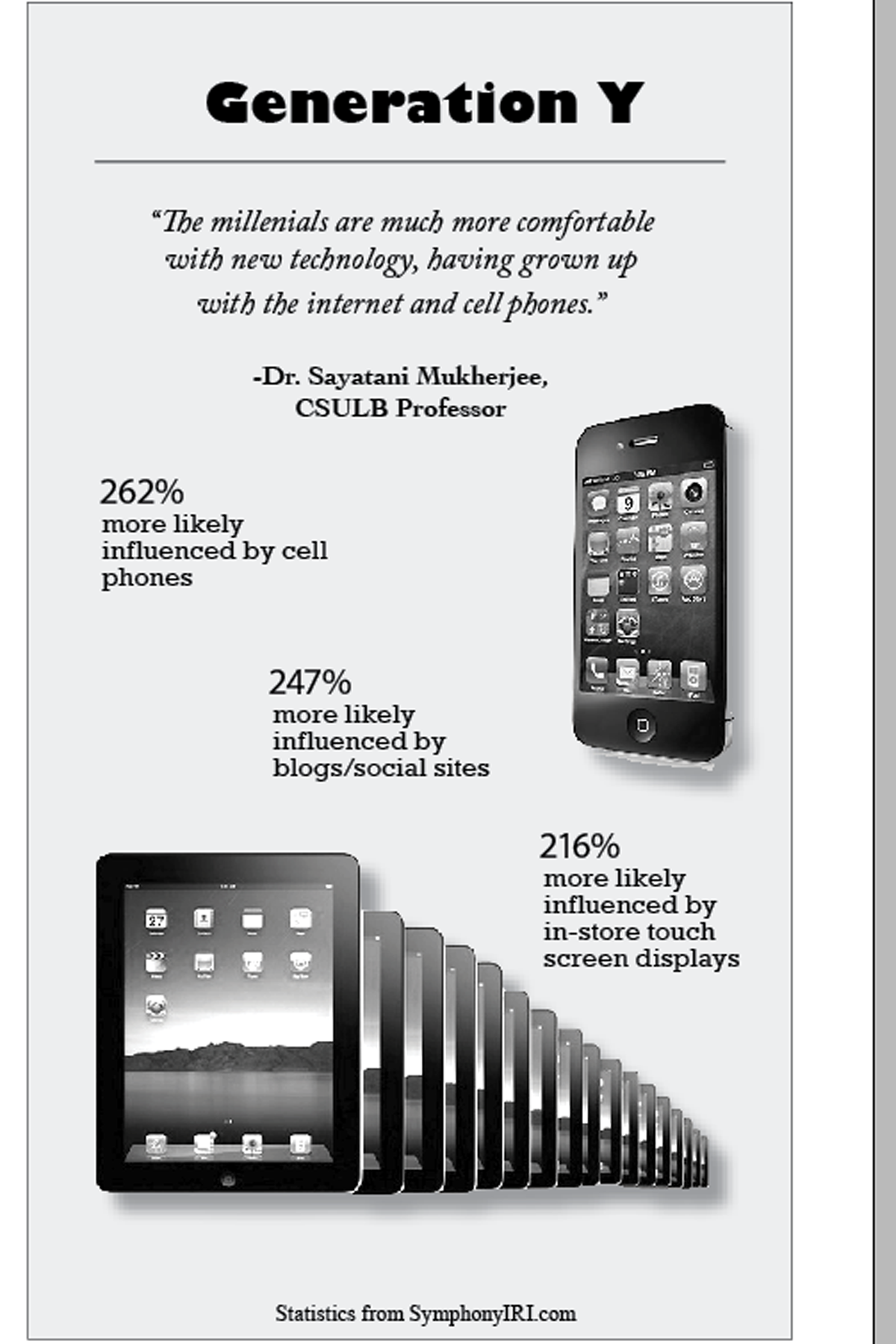Faith Lee, a Cal State Long Beach journalism senior, doesn’t pay attention to brand names. Instead, she likes to hunt online for the best bargains and even do facial remedies at home.
Lee is a “millennial,” born between the years of 1982 and the early 2000s. According to a recent survey, her spending habits differ from those of generations before her, including the baby boomers (born between the 1940s and 1960s) and generation X (born between the 1960s and early 1980s).
The survey, conducted by SymphonyIRI, found that generation Y – or the millennial generation – is less loyal to brand names when shopping for certain items, like food or housekeeping products.
The survey also found that generation Y is more price-driven when shopping and they don’t believe they can drastically change their lifestyles with a change in purchase behavior.
Unlike her mom, Lee said she prefers to purchase off-brand items.
“My mom sticks with one brand,” she said. “I don’t mind buying private brands. The quality is pretty much the same.”
The survey also made clear that if Generation Y chooses to go with a brand, that choice is driven by “digital backup,” such as advertisements on comparison websites or cellphone apps. Chair of the CSULB marketing department, Dr. Ingrid Martin, said businesses are able to reach millennials without the customary upfront or “hard-selling” manner.
“These kids are constantly hooked into the Internet … with all sorts of opportunities to … ignore ads,” Martin said via email.
Martin said marketers use all sorts of social media to communicate messages as well as advertise in programming, making the program a vehicle to provide information and encourage millenials to buy the brand.
“Through all these connections, [millennials] are exposed to ads and information in a very passive way so that it doesn’t feel like advertising in the traditional sense,” she said.
According to CSULB Marketing Professor Dr. Sayantani Mukherjee, a specialist in digital and social media, marketing agencies are coming up with new techniques to instill brand names into the minds of millennials.
“The emerging development in the social media platform is using location-based services through mobile phones and connecting other consumers physically,” Mukherjee said. “Applications such as foursquare are built around this theme.”
When shopping, students have the ability to use websites like Amazon and Ebay to find the best deal. Lee said smart phone apps, like “GasBuddy,” help her find cheaper gas prices by comparing local gas stations.
CSULB economics Professor Jack Hou said the internet makes the spread of information easier and creates a subconscious bargain-hunter mentality in the minds of millennials.
“With the side-by-side comparison, the psyche changes from looking at a value of the good rather than the brand,” Hou said.
Others, like CSULB alumna Lindsey Jeans-Shaw, depend on convenience and location while shopping. She said she goes shopping often throughout the week but buys smaller amounts.
“My mom, she likes to do big shopping trips,” she said.
Rather than using the internet to compare prices, Jeans-Shaw said she compares prices in store.
“I basically buy everything that’s on sale,” she said. “I don’t care about brands at all.”
According to Hou, millennials have different spending habits than other generations due to drastic changes in American economics, such as 9/11 and the 2008 stock meltdown.
“It instilled a sense of danger, causing [millennials] to be more cautious,” he said.
According to Hou, Generation X had a different way of spending because the economy was in better shape in the early 80s and 90s. Trends and success in investments through online trading, stocks and housing gave Generation X a mindset that they were rich.
“Generation X went through a sustained economic boom,” he said. “[They had] the feeling and mentality that money was easy to come by. They [lacked] patience,” he said.
While millennials were brought up in the age of technology, most people from older generations have yet to adapt to the changes, Hou said.
He also said that because of upcoming retirement plans, recent tuition hikes and lack of financial aid, older generations are moving in the same direction as millennials. They are however, still lagging behind.
“Habits take time to break,” he said.




